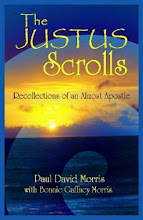The rubric these days among evangelicals is that if you are a Christian, then you are also a member of the “Religious Right,” or the “Moral Majority,” or at the very least, a Republican. And if you are not a Republican, then by definition, you are 1. Probably not really a Christian, of if you do make a profession of faith, then it is likely disingenuous. 2. Lacking in patriotism and love for country. Or, 3. You are a liberal Christian, which likewise makes your profession of faith suspect.
I sat in the class of my theology professor in seminary, lo, several millennia ago, who advised we lowly students that all Christian doctrine is derived from the Epistles, not from the Gospels, (books of history) and certainly not the book of Acts, where they spoke in tongues. As I sat there in class, a fleeting thought struck me to the effect that told me, “Hey. That is truly wrong.” The thought was quickly buried as the eminent professor moved on to the next point in the syllabus. Buried, but not dead.
Scrambling up through the dirt that was my theological training, and clawing its way out of the grave, that “fleeting” thought has followed me around for the rest of my life -- bugging me, haunting me, sticking it to me whenever I waxed too eloquent in expository preaching, explaining Greek words and stuff.
Not long after I graduated from seminary, sporting a brand-new doctorate, and after serving several churches, a copy of The Life of Christ in Stereo fell into my hands. Despite its pedestrian title, it is likely the most important book I have ever read. It changed the direction of my life and provoked a total remake of my understanding of God in general, and of Jesus Christ in particular, and not surprisingly, the critical importance of the Gospels in theological formation.
The Life of Christ in Stereo is nothing more, or less, than a brilliant, meticulous, harmony of the Gospels. The advertising trumpets it, “Four Gospels Testify as One.” Remarkably, that is exactly what it does. Johnston Cheney, a layman who had taught himself Greek, put it all together over a period of twenty years. As you read the single narrative, Matthew, Mark, Luke and John disappear and behold! Jesus appears in powerful and compelling relief.
To the end that I wish to consider the political views of Jesus in this narrative, I must acknowledge the importance of this work. That said, I wish to note in my observances of Jesus in the now dozens of times I have read this work, devoted my life to comprehending him within the pages of the Gospel narrative, and writing my own book about him, I wish to state that Jesus was unequivocally apolitical. The Gospels reveal Jesus as having the political awareness/concern of a stone. Jesus was, in a climate of intense political factions and uproar, utterly disinterested.
Note, for example, his treatment of taxation. When questioned about it, he said plainly, “Render to Caesar what is Caesar’s, and to God what is God’s.” And when accosted by tax-collectors regarding the payment of his own taxes (and that of Peter’s), he cavalierly sends Peter out to catch a fish out of which Peter extracts a gold coin and with which, as he was instructed, he paid the tax. Would God we all had such a fishing pole! Ergo, taxation was a trivial, tellurian bore to Jesus, although he clearly did not oppose it. The best that can be said about Jesus and taxation, is that he was inert to it.
This was his basic attitude toward government in general. It was an irrelevant issue. He was far more concerned with the church (synagogue/Sanhedrin) than with throwing off Roman oppression. Witness his engagement with Pilate. When told by Pilate, “Don’t you realize that I have the power to crucify you or let you go?” Jesus replied, “You don’t have any power at all except that which is given you from above.” I suspect Pilate’s eyes widened at that. But it was true. Had God the Father wished, or had Jesus himself wished, Pilate would have been completely neutralized.
So how does all this speak to people of faith?
There is no issue here with anyone having political perspectives based on what they perceive to be moral or even pragmatic concerns. There is no concern here with honest patriotism, there is no issue here with informed decisions about concerns of patriotic and/or political importance.
What concerns me is when these issues supercede their importance. In short, if we are followers of Christ and consumed with politics, we are genuinely missing something. When our lives are characterized by our political perspectives more than with our faith, we have a problem. Jesus teaches us to “Seek first the kingdom of God and all these things (which can be understood to be necessities of a satisfying and peaceful life) will be added to you.” When politics, whether the religious right, or the radical left, become divisive and engender hate and murderous intent, then they have superceded the Gospel. They have superceded our legitimate concern for one another.
They have superceded Jesus.
Subscribe to:
Post Comments (Atom)


No comments:
Post a Comment